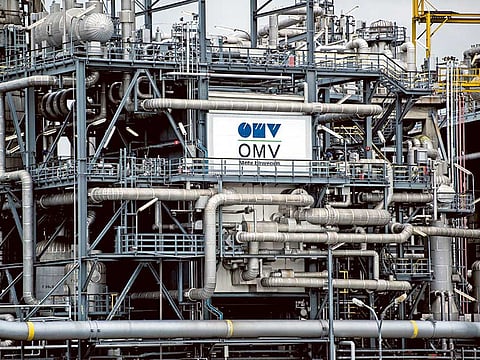OMV plans to increase its investments in Abu Dhabi, CEO says
Austrian energy group is cautiously optimistic on Libyan oil production

Abu Dhabi: Austrian energy giant OMV Group plans to step up investments in the UAE by building on its strong, existing partnerships with Abu Dhabi’s state-owned energy companies, the CEO of OMV said.
“We are ready to increase our investments and further intensify our partnership with Ipic and Adnoc. OMV has a clear vision about its business in Abu Dhabi. We would like to build step-wise, an integrated business as an investor and as a strong partner of Adnoc,” said Rainer Seele speaking to Gulf News over phone from Austria.
OMV has significant investments in Abu Dhabi and has three ongoing projects with Adnoc including the sour gas project in Shuweihat with Wintershall, an appraisal project for undeveloped offshore oil & gasfields in the north west of Abu Dhabi with Occidental Petroleum and an exploration project for oil and gas in the Eastern region.
The company is also involved in the Borouge project for the production of petrochemicals through Borealis (OMV has 36 per cent stake in Borealis).
“We are interested to increase our cooperation with Adnoc to further expand the Borouge petrochemical site, which is the world’s largest integrated petrochemical complex. Together, Adnoc and Borealis have invested around $10 billion and created 3,000 new jobs in Abu Dhabi,” he said about Borouge.
Seele is optimistic about OMV’s future relationship with Abu Dhabi, post the Ipic (International Petroleum Investment Company)-Mubadala merger, which was formalised this month. Ipic holds a 25 per cent stake in OMV.
“We are not in a position to comment on the merger. We have to wait until the merger is completed. Given the fact that we do have such good friendship between Abu Dhabi and Austria, we think this is a successful partnership between the two countries and will continue in the coming years.”
In an agreement signed last year, Ipic and the Austrian holding OBIB have decided to extend their cooperation.
Suhail Al Mazroui, UAE Energy Minister and Managing Director of Ipic said in a statement last year the continuation of the cooperation with OMV reflects strong energy ties between the two countries and strong investment of strategy of Ipic around the world.
Libya oil production
Apart from Abu Dhabi, the oil and gas firm has a number of projects in the Middle East including in trouble spots like Libya and Iran.
Seele expressed cautious optimism on Libya’s oil production.
“On Libya, we are cautiously optimistic and the country has the potential to increase its production. Our production in Libya was about 3,000 barrels of oil per day in the fourth quarter 2016.”
Libya, which is exempted from Opec’s (Organisation of the Petroleum Exporting Countries) agreement on production cuts has increased its production from 300,000 barrels a day in August, to about 700,000 barrels a day in recent times due to improvement of the security situation in the country.
On the Opec agreement, he said: “We have to be convinced that this is not just a verbal agreement but it is going to be executed. There is a strong commitment from Opec as well from non-Opec but they have to execute the deal effectively to remove the oversupply in the market for an upside potential in oil price.”
Oil price — OMV’s assumptions
“We have planned 2017 with $55 per barrel. I don’t see any reason to change my plans. May be Opec will do a great job, but I keep my plans on $55 per barrel.”
Iran investment strategy
The company has no plans to invest in Iran until it gets its money back, he said.
“We have invested quite a lot of money in Iran but because of the sanctions we could not continue in all our projects and some money could not be transferred. Before I start investing in the country, I would like to have my money back. That is fair.” The company did not disclose how much money the Islamic republic owes to it.
OMV entered Iran in 2001 as the operator of the Mehr exploration block in western Iran, leading to a successful discovery (Band-E-Karkheh) in 2005. In 2016 the National Iranian Oil Company and OMV signed a Memorandum of Understanding concerning the evaluation of various fields in the Zagros area in the west of Iran.
He also said everybody is negotiating some terms to invest in Iran and the project has to be economically viable for investments to flow into Iran.
“It has to be an economically reliable project which means we need to have a stable framework and our economic calculation needs to meet some profitability, then we are going to decide. Right now, I have not reached a decision whether to invest any dollar in Iran.”
The company will continue with cost cutting measures due to low oil prices this year, he added.
Listed on the Austrian stock exchange, OMV has a market capitalisation of approximately 11 billion euros and has upstream production in eight countries including Romania, Austria, Norway, Libya, Tunisia, Pakistan, New Zealand and Kazakhstan.
In 2015, OMV’s daily production stood at more than 300,000 barrels of oil per day. In downstream, it has an annual refining capacity of 17.8 million tonnes.
Sign up for the Daily Briefing
Get the latest news and updates straight to your inbox



